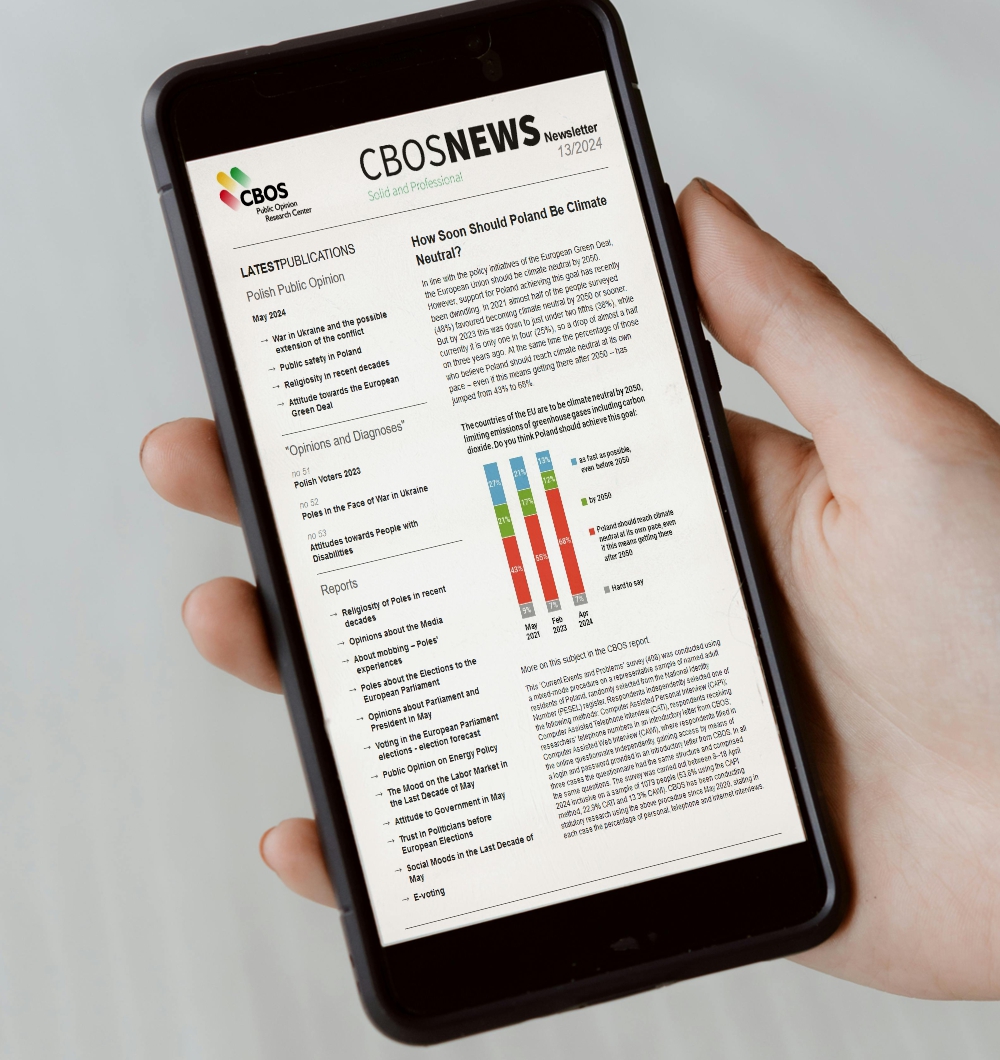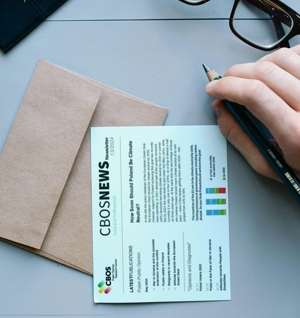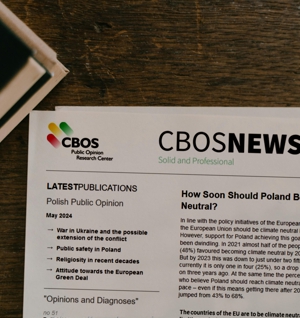CBOSNews
6/2026
How do Poles Feel about Other Nations?

For the second time in a row, the year’s league table of nations most liked by Poles is headed by the Italians, with nearly six out of ten respondents (58%) expressing positive feelings towards them and a mere 7% expressing dislike.
2026-02-20
5/2026
Polish Opinions about the European Union–Mercosur Partnership Agreement

The 17th January this year saw the signing of the European Union–Mercosur Partnership Agreement. Once ratified, it will involve a gradual reduction of import duties on most products and a consequent increase in trade between the countries of the EU and Mercosur. This agreement has elicited farmers’ protests in Europe, with Poland, France, Ireland, Austria and Hungary registering their opposition to it. The European Parliament referred the agreement to the Court of Justice of the EU to check whether it did not contravene any EU treaties.
2026-02-17
4/2026
Access to Public Transport

A bare 29% of country dwellers say that the public transport services they can access are adequate and allow them to reach their desired destinations easily and at an appropriate time. In contrast, for the largest cities this proportion is 75%. Moreover, 10% of country dwellers say that where they live there is no public transport at all, leaving them to their own devices whenever they want to go anywhere.
2026-01-29
3/2026
How the Rich are Perceived

Poles are divided in their opinions about whether the rich enjoy the esteem of other people, or not. However, those who think that affluence does engender respect are in a slight majority, with an increase of 5 percentage points since the previous survey. At the same time, the percentage of those who hold the opposite view has decreased by 7 points.
2026-01-19
2/2026
Satisfaction with Life in 2025

Polish people are most often satisfied with such aspects of their lives as where they live (86%), their social life (84%) and their children (73%). Somewhat less frequently are they satisfied with their careers (60%), education and qualifications (70%), standard of living (70%), relationships (69%), health (60%) and prospects for the future (55%). What least often brings them satisfaction is their financial situation (44%).
2026-01-16
1/2026
Poles Increasingly Pessimistic about How the War in Ukraine Will End

Poles are now even more pessimistic about the war in Ukraine than they were in September 2025, with a majority of the people surveyed taking it for granted that Ukraine will have to give up some of its territory (63%, a rise of 3 points). Most significantly, there has been a marked increase in the percentage of Poles assuming that Russia will subjugate the whole of Ukraine. This has been a marginal opinion since the beginning of the war, usually 2-4% of respondents, but now stands at 8%, a rise of 3 points. Simultaneously, positive prognoses for Ukraine are at an all-time low of 8%, a drop of 3 points, with only 6% of respondents now thinking that Russia will retreat from territories it attacked in 2022, and a miniscule 2% believing this about land invaded in 2014.
2026-01-14
31/2025
2025 better for Poland than for the World?

Public opinion is in relative agreement that climate change is a threat to us (68%), with a larger part (51%) considering it to be one of many dangers and a smaller part (17%) perceiving it as one of the greatest threats to our civilisation. On the other hand, every fifth respondent (21%) does not think climate change is a particularly dangerous phenomenon, though only a scant 5% from within this group do not associate it with danger at all. Climate denialism, the claim that there is no such thing as global heating, is a marginal position, held by only 3% of those surveyed.
2026-01-05
30/2025
Is Climate Change Seen to Be a Threat?

Public opinion is in relative agreement that climate change is a threat to us (68%), with a larger part (51%) considering it to be one of many dangers and a smaller part (17%) perceiving it as one of the greatest threats to our civilisation. On the other hand, every fifth respondent (21%) does not think climate change is a particularly dangerous phenomenon, though only a scant 5% from within this group do not associate it with danger at all. Climate denialism, the claim that there is no such thing as global heating, is a marginal position, held by only 3% of those surveyed.
2025-12-31
29/2025
Polish Senior Citizens in 2025

The elderly population in Poland has been steadily increasing for almost twenty years. In 2005 people aged 60 or over accounted for 17.2% of the general population, by 2024 this was 26.6% and now Statistics Poland predict that by 2060 the proportion will be 38.3%. The dynamic pace of this change prompts reflection about aging populations and how older people function. This year, after a gap of almost a decade, CBOS has conducted two surveys, asking people aged 60+ how they spend their time and how they rate their health.
2025-12-16
28/2025
Prodemocratic Attitudes in Poland

The year 2023 saw a clear rise in the Polish public’s faith in democracy. This was precipitated by the record-breaking turnout for the parliamentary elections that led to a change of government. The following year, however, saw a revision of this enthusiasm. But this year, after a presidential election won by a candidate in opposition to the current government, prodemocratic attitudes have again increased, though not to the 2023 level.
2025-12-08
27/2025
Views of Polish–German Relations

Public opinion concerning Polish–German relations has been subject to very dynamic changes in the period since CBOS records began. These relations were rated most highly at the very beginning of the 1990s, with positive ratings also being dominant in 2015, the last year of the Civic Platform and Polish People’s Party coalition government. The following years, when Law and Justice was in power, saw a systematic decline in the number of people who thought relations between Poland and her western neighbour were good. By the end of their rule a mere 13% of those surveyed were of this opinion. Now, two years since the last survey, there has been a clear improvement in this assessment, with a surge of 12 percentage points among those who see Polish–German relations as good and a drop of 4 points among those who see them as bad. Almost half of adult Poles (48%) see Polish–German relations as neither good nor bad, one in four as good and 18% as bad.
2025-11-21
26/2025
A New School Subject

Of the people who have heard of health education, 60% support the introduction of this new subject into schools, with the majority (37%) being strongly in favour. On the other hand, 31% of the people surveyed are against the new subject, with 9% having no clear view.
2025-11-19
25/2025
Thoughts on Housing Policy

Among the people surveyed on this issue, by far the largest group are of the opinion that the state should first and foremost make it easier for people to buy or build homes that they will own. Much smaller, similarly-sized groups of respondents think that, above all, the state should be providing social housing for people who are less well-off or prioritising affordable housing for people to rent either individually or through housing co-ops. In almost all the socio-demographic groups analysed the top answer was that buying homes to own should be made easier. An exception were pensioners and people aged 65 and over, who were a little more likely to indicate that the state should primarily support social housing.
2025-11-18
24/2025
Young Adults Living with Their Parents

In Poland 39% of unmarried people aged 25–34 live with their parents. The percentage now is higher than in 2005 and 2017, when CBOS previously looked at this issue. The figures then were 29% and 34% respectively. A decided majority of this group of people are in work (83%) and financially independent of their parents (72%).
2025-11-14
23/2025
More Children Participate in Extracurricular Activities

At the start of the current school year, four fifths (80%) of parents said that at least one of their school-aged children was participating, or going to participate, in paid extracurricular activities. This is by far the highest result since CBOS records began in the 1998-9 school year. As in previous years, the vast majority of parents who have decided to pay for these activities for their children will do so for all them. The most common extracurricular activities – sports – are, or will be, paid for by 57% of parents.
2025-11-13
22/2025
Should Ukrainian Refugees Get Child Benefit and Free Health Care?

After the question of whether Ukrainian refugees should be eligible for child benefit or free health care became hotly debated in public, CBOS asked Poles for their opinions. The key issue for the people surveyed turned out to be working and paying taxes in Poland. A majority of respondents (58%) stated that child benefit and free health care should be available to all Ukrainians (not just refugees) who work and pay taxes here. Every fourth respondent (25%) said that as well as working and paying taxes, Ukrainians should have refugee status. One in twelve (8%) was of the opinion that no Ukrainians in Poland should be eligible for such services. Only a very small percentage of respondents (3%) thought these services should be available without limitations to Ukrainian refugees who had come to Poland after the outbreak of war, which has been the situation up to now, or generally to all Ukrainians living in Poland.
2025-10-24
21/2025
Expectations Regarding Karol Nawrocki’s Presidency

At the very start of his presidency Karol Nawrocki inspired more hope (47%) than fears (37%) in his compatriots. Similarly, over a half of those surveyed expected him to be a good president (53%), although for the most part this optimism was guarded. A third of respondents (33%), however, were of the opposite opinion and thought Karol Nawrocki would not make a good head of state.
2025-10-22
20/2025
Going Away during the Summer Holidays

This year school students from almost three quarters (73%) of households with young people of school age went away on a holiday of at least a week, a rise of 2 percentage points on last year. In most cases (63%), all the children in a household went away (a rise of 3 points), with only one family in ten (10%) sending away only some of them. In the years since 1993, this year’s holidays are second only to those in 2018 regarding the percentage of young people going away.
2025-10-21
19/2025
Is Poland’s Independence Under Threat?

During the night of 9–10 September Polish airspace was repeatedly violated by Russian drones. In a survey carried out between 11 and 22 September 2025, CBOS asked Polish people if they felt the independence of their country was threatened.
2025-10-10
18/2025
Opinions on the Functioning of the Health Care System

Of all the aspects of health care included in the CBOS survey, Poles were most appreciative of doctors’ competence (73%) and commitment (64%), ease of access to general practitioners (63%) and their diagnostic skills (60%), and the use of up-to-date equipment in the health service (NFZ).
2025-10-07
17/2025
Social Media

Six out of ten (60%) Polish adults report having some presence on social media. This represents over three quarters of all internet users.
2025-07-15
16/2025
Online and Traditional Media in the Election Campaign

When comparing data from previous presidential elections in 2020 and 2015 with current results, the record number of people reaching for online sources of information clearly shows how the political significance of the internet has grown. Unsurprisingly, there has been a concurrent decline in the importance of the traditional media: television, radio and the press. At the same time, this election campaign has seen more emphasis than previously given to meetings and rallies. The exchange of political information with friends and family has remained relatively stable, as has the acquiring of information from posters, leaflets and billboards.
2025-07-08
15/2025
Pope Francis: What Polish People Appreciated about Him

The May CBOS survey asked what, if anything, Poles appreciated about the recently deceased pope. Respondents were presented with a list of areas in which Francis had achievements or had taken a particular stance, and asked to choose three of these.
2025-06-06
14/2025
Are Poles Afraid There Will Be a War Between Russia and NATO? What Would They Do if There Was?

Fears that the Russian–Ukrainian war could spread to NATO countries are lower now than in April 2024.
2025-06-04
13/2025
Interest in Undergoing Military Training

CBOS asked all respondents, whatever their previous experience, whether they would like to participate in some form of military training. Just over a quarter (26%) expressed interest, but only one in twenty (5%) were definite about it. On the other hand, in the majority group that was not interested in the training, most respondents (45%) were definite about this.
2025-05-28
12/2025
Worries about Crime

While six out of ten Poles do not harbour fears of becoming victims of crime, that still leaves two fifths (41%) who do – a rise of 6 percentage points over last year, bringing the level close to that of 2021–2022.
2025-05-26
11/2025
Significant Downturn in Positive Perceptions of Polish–US Relations

Compared to the survey results of two years ago, when President Joe Biden came to Warsaw and confirmed US support for both Ukraine and the eastern flank of Nato, positive assessments of Polish–US relations have plummeted – they are now virtually fifty percentage points lower (down from 80% to 31%). At the same time ambivalence has soared (from 14% to 52%) and negative assessments have also markedly risen (from 1% to 10%). These results are hardly better than those noted by CBOS prior to 1989, when Poland, as part of the Warsaw Pact, was subordinate to the USSR and thus hostile to the USA.
2025-05-05
10/2025
Who Can Be Considered Polish?

In the latest CBOS survey respondents were asked a series of questions concerning foreigners living in Poland and the preferred ways they could integrate into Polish society. At the same time, we took the opportunity to return to a question we asked ten and twenty years ago: what criteria are essential for someone to be considered Polish? Respondents could choose the two most important attributes from a list. With the passage of time and the influx of immigrants, many aspects of what is required from would-be Poles have changed and, in general, have become more demanding.
2025-04-29
9/2025
Feeling Sure of NATO?

Support for Poland’s membership of NATO continues to be very high, with 89% of Polish adults being in favour of membership and only 2% against. However, year on year, there has been a significant drop (of 18 percentage points) in respondents who believe Poland can be sure that its NATO allies will engage in defence of its borders, should the need arise. Currently 61% of those surveyed believe this, while 28% are doubtful. This change is most likely a result of statements made by members of the new US administration, whose narration is less equivocal than their predecessors’.
2025-04-24
8/2025
Ban on the Use of Smartphones in Schools

Pupils’ use of smartphones in schools and other educational establishments is not regulated by Polish law, leaving each institution to draw up its own rules. In the March survey, CBOS asked Polish people what they thought about this.
2025-04-22
7/2025
Most Polish People Doubt whether Europe would Be Able to Support Ukraine’s Defence Effectively without US Help

Many European commentators and some leading politicians, such as Emmanuel Macron or Friedrich Merz, have reacted to Donald Trump’s moves regarding Ukraine with the suggestion that Europe should stop relying on American help and accelerate the process of arming itself, and also prepare for being the sole support of Ukraine’s defence. There are rumours that the USA are considering withdrawing from leadership of NATO forces in Europe, which could be a prelude to leaving NATO altogether. This would leave Europe isolated in the face of the Russian threat. But would Europe without US help be able to support Ukraine to the extent that its effective defence remained possible? The people CBOS surveyed were doubtful about this: the majority (60%) thought not, while only a little over one in four (28%) thought Europe could manage it.
2025-04-10
6/2025
Observing the Presidential Experiment

Can Sławomir Mentzen go through to the second round of the presidential election? Why is Karol Nawrocki an implausible political experiment? If the election result is to be decided by young voters, who has the greatest chance of winning their votes?
2025-03-21
5/2025
2024: a Record Year for Polish Tourists Abroad

In comparison with 2023, the year 2024 saw a rise of two percentage points, to 16%, in the number of respondents who had holidays both at home and abroad, and a rise of three points, to 13%, in those who went abroad only. Together this amounts to 29% of adult Poles who went abroad in 2024 for holidays or breaks with at least one overnight stay. This is the highest percentage since CBOS records began in 2010.
2025-02-28
4/2025
What other Nations Do Poles Like Best or Least?

This year’s league table of nations most liked by Poles is headed by the Italians, with Americans in second place and the Spanish in third. Not far behind are the Czechs, the English, Slovaks and Norwegians, with Lithuanians, the French and Hungarians completing the top ten. A clear level of liking over dislike can also be seen in relation to Estonians, about whom a significant part of those surveyed have no precise views. Poles either feel ambivalent about the remaining nations in the survey, or dislike them to a greater or lesser extent. Russians are overwhelming disliked; Belarussians and Roma are also clearly disliked, though to a much lesser extent than Russians.
2025-02-27
3/2025
Women Want Real Democracy

Welcome to the CBOS Podcast where, along with our learned guests, we analyse processes and phenomena in the areas of politics, culture and economics.
2025-02-26
2/2025
Cultural Activities in the Past Year

In 2024 more people engaged in cultural activities than in the previous year: the percentage of Poles who went to the theatre, to an exhibition, museum or art gallery at least once, rose by five points. The proportion of those who went to an art gallery or museum exceeded a third (37%), while visits to the theatre (at 27%) achieved the highest point since CBOS records began.
2025-02-19
1/2025
Welcome to the New CBOS Podcast!

Once a month we will be asking our learned guests for an analysis of processes and phenomena in the areas of politics, culture and economics.
2025-01-22
32/2024
For the first time a majority of Poles think the war in Ukraine should be ended even at the cost of concessions to Russia

At various stages of the war, the dominant feeling among Polish people has always been that Ukrainians (with Western support) should continue to fight and make no concessions to Russia. Nevertheless, since the beginning of the war’s second year, this proportion has been steadily diminishing and now, over the last three months, it has dropped fifteen percentage points. Currently, for the first time since the outbreak of the war, the dominant opinion among Poles is that the conflict needs to be ended and peace declared, even if Ukraine would have to give up some of its territory or independence as a result (55% compared to 39% in September). Fewer than one in three Polish people now believe the struggle should continue without conceding anything to Russia (31% as against 46% in September).
2025-01-03
31/2024
The Digital Transformation of Public Administration

Four fifths of respondents (80%) are aware that a lot of official business can be carried out online, without the need of making your way to an office. Compared to 2017 this is an increase of 22 percentage points.
2024-12-11
30/2024
Polish Participation in Nuclear Sharing

The subject of inclusion in nuclear sharing has returned to public debate in Poland. Full inclusion would involve the deployment of US nuclear weapons on Polish soil and certification of Polish warplanes for their delivery. The recent CBOS survey shows that opinions on this subject are unusually divided. The percentage of those in favour (44%) is only a few points greater than the percentage of those against (40%), while as many as 16% of those surveyed had no opinion at all.
2024-12-09
29/2024
What Sort of Courses Do Polish People Take?

October’s survey was the first time CBOS asked Poles about the courses they took to improve themselves and raise their qualifications beyond what they had achieved within the standard education system. The survey revealed that a majority (64%) of Polish people participated in supplementary courses or postgraduate studies to add to the knowledge and skills they had gained at school or university. Every sixth person surveyed (17%) said they had undertaken such a course within the last year, for one in eight (13%) it was within the last 2–3 years, every third respondent (34%) had taken a course less recently, while over a third of those surveyed (35%) had never done so.
2024-12-03
28/2024
Problems with Environmental Shortages or Excesses of Water

From the responses of the people surveyed it is clear that more Poles have problems with the effects of drought on agriculture or nature in general, than with flooding. An overwhelming majority of respondents (69%) have experienced drought in their areas, while for one in four it is a regular occurrence, happening every, or almost every, year. Flooding in their area, on the other hand, has been experienced by only 28% of respondents, with very few (1%) seeing it every year. Moreover, a decided majority of those living in areas subject to drought (71% of this group) are sure that this is a more frequent occurrence in recent years than in the past, while over half (52%) of respondents from areas affected by flooding say that it used to happen as often in the past as more recently.
2024-11-25
27/2024
Keys to Career Success

According to more than half of adult Poles (59%) the key to career success is possessing knowledge and skills. In second place of importance is diligent work, indicated by somewhat over two fifths of those surveyed (43%). Fewer than one in three people thought that education had the largest influence on career success (30%). This ranking of key factors has remained stable for over a decade, though the last seven years have seen more emphasis placed on initiative and business acumen (up 4 percentage points to today’s 22%).
2024-11-15
26/2024
Extra-curricular, Paid Activities in the 2024-5 School Year

This school year, a record proportion of almost three quarters (73%) of parents of school-age children are paying for, or intending to pay for, extra-curricular activities for their offspring, to support either their educational or overall development.
2024-11-14
25/2024
Getting Covid, Getting Vaccinated

About every third person surveyed (32%) say the have had Covid once, while a further 13% say they have been through it several times. Half (50%) of Polish people say they have not had Covid at all. The fact that someone has had the virus does not make them more interested in vaccination and most respondents have no desire to be vaccinated against it within the next six months: 53% are very sure about this, while 25% simply do not see the need. On the other hand, one in ten people (10%) would like to get vaccinated in the near future and a further 7% are very certain of this.
2024-11-13
24/2024
Inappropriate Online Content

Today’s idea of the internet, which is based to a large extent on social media, assumes that not only can everyone receive information, but that all of us can create and post it. Although such democratisation of the creation and passing on of material has many advantages, there are also risks arising from the fact that online content is not subject to the same controls as the traditional media of TV, radio and press. CBOS asked Polish people whether they had come across online content which they felt was inappropriate, shocking or not adhering to accepted norms. This turned out to be the experience of three quarters of the people who watch videos made by online content creators (including videos featuring such creators) or read comments posted by other internet users. Worth underlining is the fact that for a majority of respondents (73%) this was not an isolated experience and for two fifths (40%) it was something they experienced frequently.
2024-11-12
23/2024
Poles Increasingly Pessimistic in Their Predictions of How the War in Ukraine Will End

Currently the dominant opinion among Poles is that, in the end, Ukraine will have to give up some of its territory (44%). At the same time optimistic voices are at an all-time low: that Russia will retreat from territories occupied in 2022 (19%) and in 2014 (6%). In addition, 4% of those surveyed assume that Russia will subjugate all of Ukraine, A huge 27% are unable to form an opinion on the matter. These results suggest that Polish people have been more influenced by reports of the worsening situation for the Ukrainian army on the main segments of the front, than by triumphant news of the Kursk offensive.
2024-10-15
22/2024
What Do Poles Feel about Artificial Intelligence?

The development of artificial intelligence elicits mixed feelings in Polish people, with almost the same number of respondents expressing anxiety (59%) as curiosity (58%) about it. Almost half of those surveyed (49%) are keeping this evolving technology at arm’s length, saying they mistrust it. Nevertheless, over a quarter (27%) hope AI will develop in a positive direction and benefit people. On the other hand, every fifth respondent (20%) feels helpless in the face of the power of this complex technology. Almost one in six (18%) is indifferent to AI, most likely because of not being aware of using it. The lowest percentage (though not at all small) comprises those enthusiastic about AI (14%).
2024-10-14
21/2024
Religious Education in Schools

The government is bringing in changes into religious education (RE) in schools. Some of these have already come into effect this school year, such as lessons where classes are combined if otherwise numbers would be low, or not including marks from RE in a pupil’s end-of-year average. Next school year religious education will be limited to one lesson a week.
2024-10-11
20/2024
Artificial Intelligence in Daily Life

CBOS has, for the first time, asked Poles about artificial intelligence, including whether they make use of AI in their everyday lives. It turns out that a majority (60%) do not generally use technologies based on AI. Over one in three respondents (35%) consciously use AI in their daily lives, while a bare one in twenty (5%) say they are not sure whether they make use of AI or not.
2024-10-04
19/2024
Polish People’s BMI

Respondents were asked to give their height and weight, from which it was then possible to calculate their Body Mass Index (BMI). The calculations are based on people’s answers and not on objectively measured parameters, thus they may not be a true reflection of reality, particularly regarding weight, which is a sensitive issue for some people. Keeping that in mind, it can be said that six out of ten adults (59%) weigh more than they ought to: two fifths (40%) are overweight and one fifth (19%) are obese. The BMI of two fifths of those surveyed (40%) shows their weight to be within the normal range. A very few – two in a hundred (2%) were found to be underweight. Not much has changed since the previous survey five years ago, apart from a minimal movement of people from the obese to the overweight group. On the other hand, both these two surveys clearly differ from the previous two in 2010 and 2014, when Polish adults were generally lighter (their weight more often fell within the correct limits and they were less frequently found to be overweight or obese).
2024-09-30
18/2024
Growing Support for LGBTQ People

Over the last three years there has been a clear increase in Polish people’s support for LGBTQ rights. In comparison to 2021, the percentage of Poles who think that gay men and lesbians should have the right to be open about their orientation in public has risen by 9 points, with a simultaneous 10-point increase in the percentage of respondents believing that gay men and lesbians should be able to marry their partners. On both these issues the percentages in favour are only a few points lower than those against. More controversial is the issue of adoption by same-sex couples, which is now supported by almost one in four Poles, when five years ago the number was less than half that. In all three cases approval is the highest it has been since CBOS began researching the subject.
2024-09-26
17/2024
Are Poles Happy with Their Appearance?

Slightly over a fifth (21%) of Polish adults are definitely happy with how they look, while a further 53% are mostly pleased with their appearance. A quarter (25%) are not happy with what they see in the mirror, which is 5 percentage points more than in 2017.
2024-08-29
16/2024
The Warsaw Uprising 80 Years On

Polish people see the Warsaw Uprising as very important (91% of those surveyed think so) and most of them consider that it was worth joining battle. Currently, just as a decade ago, the belief that it was necessary to do so is noticeably stronger than in the 1990s.
2024-08-06
15/2024
Civil Partnerships: Yes or No?

Attitudes to civil partnerships differ depending on whether these are to be partnerships between people of the same sex or opposite sexes. An overwhelming majority of people (90%) agree to civil partnerships between a woman and a man, with only 6% being against. However, only just over a half (52%) would legalise such partnerships between people of the same sex, and over two fifths (43%) think this should not be possible.
2024-08-05
14/2024
Attitudes towards Migrants on the Belarus Border Worsen

Polish media are again giving increased coverage to tensions on the Poland-Belarus border. In recent weeks attempts to cross this border illegally have become more violent, leading to the death of a young Polish soldier. While this crisis has certainly intensified recently, it has actually been ongoing since 2021, the time of the first CBOS survey into attitudes towards the people arriving at the Poland-Belarus border. Right from the start Poles tended to be averse to giving them the opportunity to apply for asylum in this country (in December 2021 58% of respondents were opposed to this, while 33% were in favour). Currently attitudes have hardened, with a clear majority saying there should be no chance for migrants on this border to apply for asylum in Poland (72%) with only one in five (20%) holding the opposite view.
2024-07-11
13/2024
How Soon Should Poland Be Climate Neutral?

In line with the policy initiatives of the European Green Deal, the European Union should be climate neutral by 2050. However, support for Poland achieving this goal has recently been dwindling. In 2021 almost half of the people surveyed (48%) favoured becoming climate neutral by 2050 or sooner. But by 2023 this was down to just under two fifths (38%), while currently it is only one in four (25%), so a drop of almost a half on three years ago. At the same time the percentage of those who believe Poland should reach climate neutral at its own pace – even if this means getting there after 2050 – has jumped from 43% to 68%.
2024-06-26
12/2024
How Should Poland Function within the EU?

There are clear differences between the most important parties’ electorates in their expectations of how Poland should function within the EU. Supporters of the governing coalition mostly declare that in the European elections they will vote for a candidate who advocates increasing European integration. The strongest such declarations come from Civic Coalition voters, while supporters of the Third Way more often express doubts on the matter. The electorates of opposition parties Law and Justice or Confederation are more uniform in their approach and generally want to vote for candidates emphasising Poland’s autonomy within the EU.
2024-06-24
11/2024
Fear of Crime

Somewhat over a third of people surveyed (35%) are worried about becoming victims of crime, with 4% being very anxious about this and 31% less so. Changes compared to last year are slight and within the limits of statistical error. Almost two thirds of Polish adults (64%, an increase of 3 percentage points on 2023) does not admit to this type of anxiety, and 17% maintain that in this respect they are not worried at all.
2024-06-06
10/2024
Are Polish People Preparing for War?

The CBOS March survey showed that over a half of Poles believe in the probability of an armed Russian attack on a NATO country within the next few years. In April CBOS looked at this in greater depth, asking respondents if they are making any sort of preparations for the possibility of a Russian attack. As it turns out, a majority of the people surveyed (62%) are not doing anything, although 18% of respondents were able to name one way in which they were preparing and one in nine (11%) could name two ways.
2024-06-05
9/2024
Do Polish People Think that a Russian Attack on NATO Countries Is Likely?

An increasing number of western experts, politicians and members of the armed forces have been talking about the possibility of a Russian attack on NATO countries, usually mentioning particular timescales within which such an attack could happen. These mostly range from three to eight years, although some give NATO even less time. What do the people CBOS asked think? It turns out that over a half of Polish people (57%) believe that a Russian attack on NATO countries is likely, with 14% thinking it is very likely. One in three of those surveyed (32%) are of the opposite opinion, though only 4% believe it to be quite unlikely. One in nine respondents (11%) have no opinion about this.
2024-04-23
8/2024
Easter Traditions

Observance of Polish Easter traditions remains at a stable level. Virtually nine out of ten of those surveyed (89%) said that at the start of the Easter Sunday breakfast they exchanged good wishes with their families while sharing the customary hard-boiled egg. Almost as many (86%) took baskets with eggs and other Easter food items to be blessed at church on Holy Saturday. Around two thirds (69%) continued the Easter Monday custom of śmigus dyngus: sprinkling – or even drenching – family members with water. A similar percentage (66%) continued the custom of decorating eggs by dyeing, painting or other techniques. A half, or just under a half, of Polish people engaged in religious practices, such as the annual duty of confession and communion, or participated in the Easter Triduum – the period of three days that begins with the liturgy on the evening of Maundy Thursday and ends with evening prayer on Easter Sunday.
2024-03-29
7/2024
Who do Polish People Like Most and Who Least?

As last year, the people we like most are the Americans. In close second place are the Italians, followed by our favourite neighbours: the Czechs and Slovaks. Most respondents also expressed liking for the English and Lithuanians, while almost half also liked Finns, Hungarians and the French. Georgians, Ukrainians and Germans were liked by 40% of those surveyed, although the latter two groups were also disliked by a fairly high percentage.
2024-03-28
6/2024
25 years of Poland in NATO

Pro-NATO attitudes were never as widespread in Poland as they have been since March 2022, although ever since April 2014 greater support for NATO than in previous surveys had also been observable. This is undoubtedly connected with the fate of Ukraine over the last ten years.
2024-03-20
5/2024
Revival of Domestic Tourism after the Pandemic

In the years since 2020 and the Covid-generated collapse of tourism, driven by administratively imposed restrictions and people’s fear of becoming infected, Poles have gradually returned to going away for breaks involving at least one overnight stay. In 2023 over three fifths (61%) of adult Poles went away for at least two days – 7 percentage points more than in 2022. This is also the highest result since CBOS began asking about such trips in 2012, with only the 2018 result coming close. At the beginning of 2023, interestingly enough, only 55% of respondents were planning to go away, so it is the first time in the history of this research that trips taken have exceeded trips being planned at the start of the year.
2024-03-19
4/2024
Opinions about the Morning-after Pill

Polish people are divided in their opinions about access without prescription to emergency contraception for people over the age of 15. The recent parliamentary amendment to the pharmaceuticals law does away with the need for a prescription. At 50%, a somewhat greater percentage of people support this, than the 42% opposed to it. The remaining 8% found it hard to say.
2024-03-15
3/2024
What Was Important in 2023?

Decidedly the most significant event of 2023 in Poland was, according to Poles, the parliamentary election, or – more precisely – the result: victory for the democratic opposition and the end of the Law and Justice government (indicated by 65.3% of respondents). Looking at the wider world, 2023 will be remembered as a year of wars. On the one hand respondents pointed to the ongoing war in Ukraine (27.1%), on the other to the war in the Gaza Strip – an international conflict that erupted with renewed vigour after the Hamas attack on Israel (23.2%). A further 7% indicated armed conflicts in general as most significant last year. In all, almost three fifths of Polish people (57.3%) indicated a war or wars as the most significant things to happen in 2023.
2024-02-13
2/2024
What Poles Did in 2023

After the two pandemic years and the first year of war in Ukraine, Polish people’s participation in social activities and events has returned to the previous trend for growth. The only significant decrease is in charitable activity, with the percentage of people donating money or goods to charity much lower than in 2022, when there was an explosion of help for refugees from Ukraine. The biggest rise has been in the percentages of people taking holidays and going to concerts.
2024-02-12
1/2024
What Poles Say about Their Incomes

Of all the various aspects of life, the greatest increase in Polish people’s satisfaction last year was with their incomes and general financial situation, despite this being a subject that usually shows the smallest such rise. People’s responses correspond with the data of the Central Statistical Office (GUS), which show that the average nominal gross income reached its highest level ever in December 2023, at over 8,000 PLN. At the same time Polish people’s satisfaction with their incomes and general financial situation shot up by 10 percentage points on the previous year. Currently, virtually two fifths of those surveyed (39%) say they are happy with their financial position, while in December 2022 just over a quarter (29%) said this. Simultaneously the level of dissatisfaction has dropped by five points, which now gives only a fifth of adult Poles (20%) unhappy about their financial position.
2024-02-01
33/2023
What Does Christmas Mean to Us?

In December CBOS asked respondents about the meaning of Christmas for them. It turned out that for a majority of Poles (62%) Christmas was mostly about celebrating with family. Just under one in five (19%) saw it primarily as a religious experience, for one in ten (10%) it was a nice tradition, while for one in twenty (5%) it meant a rest and a break from work. Although the form in which CBOS asked this question has been somewhat different in previous years, the relatively low percentage of respondents for whom Christmas is primarily a religious festival is in keeping with the observed diminishing importance of this religious aspect, noted over the years.
2024-01-04
32/2023
On which Side of the Israeli – Palestinian Conflict Do Polish Sympathies Lie?

The CBOS November survey showed that the Israeli – Palestinian conflict taking place in the Middle East is an important topic of conversation among Polish people. In an expansion of this subject in December, respondents were asked which side of the conflict they sympathised with more. It turned out that Poles are slightly more favourably disposed towards Israel (14%, compared to 10% sympathising more with the Palestinian side). It is worth noting, however, that people with clear views about this war are in a minority: the dominant response was ‘hard to say’ (43%), closely followed by sympathy for both sides in equal measure (33%).
2024-01-03
31/2023
Assessment of the Conduct of the Electoral Process

A decided majority of Polish adults (83%) did not notice any irregularities in the conduct of the recent elections to the two houses of parliament, while 9% expressed the belief that irregularities did occur. Another 7% did not have an opinion on the subject and one in a hundred refused to answer the question. Despite the fact that doubts as to the correctness of the electoral process were expressed slightly less frequently than after the last presidential election, these parliamentary elections were still rated much more negatively than the previous ones: the number of respondents believing that irregularities had occurred was up by 8 percentage points, while the number of those who said they had not noticed any such irregularities was down by 11 points.
2023-12-15
30/2023
The Advantages of People from Outside the EU Working in Poland

The majority of people surveyed see the work of foreign nationals from outside the EU as beneficial for the Polish individuals and businesses employing them (83% as against 8% who do not) and also for the Polish economy as a whole (72% as against 17%). Most respondents are also of the opinion that there are advantages from this for all working people (56% as against 29%) and themselves personally (48% as against 25%). The last four years have seen a strengthening of the view that employing foreign nationals from outside the EU benefits working people as a whole, while slightly fewer people see the advantages for the individuals and businesses that actually hire them. More respondents than four years ago see this as either a positive or a negative for themselves. Opinions about the advantages to the Polish economy have remained relatively stable.
2023-11-27
29/2023
Assessment of the Ninth-term Sejm

The ninth term of the Sejm (the lower house of the Polish parliament), currently drawing to a close, has been assessed similarly to the previous three: it achieved a lot while also leaving many things undone. This was the answer selected by 39% of respondents in the CBOS October survey.
2023-11-24
28/2023
How Widespread This School Year Are Extra Classes Paid for by Parents?

The start of the 2023-24 school year showed a clear rise in the number of extra classes taken by school students and paid for by parents. Almost three quarters (72%, a rise of 7 percentage points on last year) of the parents surveyed stated that at least one of their school-aged children attended extra classes or was about to do so. These are classes paid for by parents, which take place either at school or elsewhere. The percentage of parents saying they are paying, or about to pay, for their children to attend such classes is the highest since records began in 1998. As in previous years, foreign languages are the most common classes to be taken by school-aged young people, with a half of parents (50%) already paying or intending to pay for them this school year.
2023-11-21
27/2023
Looking at How Poles Would Vote in the Parliamentary Elections

In order to get the most accurate picture of Polish people’s voting preferences in the run-up to the general elections, CBOS made use of the potential of two different research methods, aggregating the data from each. Both were conducted during a similar time period: the survey on a representative sample of named adults, randomly selected from the National Identity Number (PESEL) register (N=1110) was conducted between 2–11 October, while the telephone survey on a random sample of mobile phone users (N=1000) was limited to 9–12 October, in the week immediately preceding the elections. Assuming a turnout of 68% (1443 people) and excluding the undecided (14% i.e. 200 people) and those who refused to give an answer (4% i.e. 61 people), the following picture of support for the competing electoral committees emerged:
2023-10-24
26/2023
Going Away during the Summer Holidays

During this year’s summer holidays a similar proportion of children and school-aged young people went away on a holiday of at least a week as did last year (68%), and on the whole this was the case for all the young people in a household (57%). While there has been a tiny rise in households declaring children’s holidays of at least two weeks (28%, up by one percentage point), there has been a drop in those that sent all their young people on a fortnight’s holiday (17%, down by 5 points).
2023-10-23
25/2023
Majority of Polish People Opposed to Ukrainian Cultural Centres, Schools, Churches or Districts in Poland

In the October survey CBOS asked people what they thought about Ukrainians living in Poland setting up their own schools, cultural centres, districts or churches. The results show that such initiatives are likely to elicit disapproval, with the answers to each of the questions being mostly negative. The most divided – though still largely negative – were opinions regarding Ukrainian cultural centres in Poland, with 48% against and 42% in favour. Clearer opposition was expressed towards Ukrainian Orthodox churches (51% against and 39% in favour), and this was even greater when it came to schools (58% as against 31%). Finally, Ukrainian districts in Poland’s big cities were opposed by an overwhelming majority of Poles (87% as against 7%).
2023-10-04
24/2023
Who do Poles Think Will Win the Forthcoming Elections?

According to responses collected in the CBOS September survey it looks like Law and Justice will win the elections to the Sejm. In the Senate seats could be fairly evenly distributed between Law and Justice and its partners on the one hand, and a probable coalition of opposition parties on the other.
2023-10-03
23/2023
War Reparations from Germany

Announcements that Poland was to seek war reparations from Germany were, from the outset, met with a positive reception by people surveyed. The greatest support for pursuing this course of action was noted in July 2019 (69%). Currently 58% of respondents are in favour, including 38% decidedly so, with less than a third (32%) being against, and only 11% saying ‘decidedly not.’ In comparison to last September, support for claiming war reparations has risen minimally, although it is still lower than in August 2019 or October 2021. In addition, there are fewer opponents of this action than last September.
2023-09-27
22/2023
Should the Embargo on Ukrainian Grain be Extended?

There is an EU ban in place until 15 September on bringing in wheat, maize, rapeseed and sunflower seeds from Ukraine to Poland and other central and east European countries. Almost two thirds of the people surveyed (65%) expressed the opinion that this ban should be extended, with a significant part (39%) being definite about this.
2023-09-15
21/2023
Medical Services – NFZ or Private?

In the six months prior to this survey, a quarter (24%) of respondents only made use of medical services provided by the state health insurance system (NFZ), while a tenth (11%) used only those they paid for themselves, either directly or through private health insurance or subscription schemes. The largest group, 51%, made use of both. The remaining respondents (14%) had not accessed any health services in the last six months.
2023-08-30
20/2023
Positive Assessments of Polish‑Ukrainian Relations More than Double

The percentage of Polish people who see Polish-Ukrainian relations as good has more than doubled since 2018 (64% as against 29% five years ago), which is undoubtedly an effect of the closer relations between the two nations since the Russian invasion of Ukraine. It is worth noting that an earlier increase in such a positive view occurred after Russia annexed Crimea in 2014. A mere 4% of Poles think Polish-Ukrainian relations are bad.
2023-07-25
19/2023
Raising the 500+ Child Benefit

Polish people are divided on the subject of raising the 500+ child benefit to 800 zloty: 50% of those asked supported the idea, while 46% were against. The remaining 4% had no opinion on the subject. Worth noticing is that those who supported the raise more often did so cautiously (‘Somewhat in favour’ – 27%) than wholeheartedly (‘Definitely in favour’ – 23%), whereas among those not supporting it there were more decided opponents (27%) than moderate ones (19%).
2023-07-24
18/2023
Views on Setting up the Commission to Investigate Russian Influence

The act establishing a National Commission to investigate Russian influence on the internal security of the Republic of Poland 2007–2022 became law on 31 May 2023. It was then amended by the president on 16 June.
2023-06-28
17/2023
Almost Half of Polish People Blame the Grain Crisis on the Government

In the May survey people were asked who they thought was most responsible for the problems, dubbed the grain crisis, brought about by the uncontrolled influx of Ukrainian grain into Poland. Almost half (45%) saw the government as being chiefly to blame, first by reacting sluggishly to the problems farmers were reporting, then acting too precipitously. In second place (20%) were the grain traders and in third (16%) the European Union. Ukraine itself was least often held responsible (2%). Almost one in five respondents (17%) had no opinion on this subject.
2023-06-19
16/2023
Is Pope John Paul II a Moral Authority for Poles?

The broadcast of Marcin Gutkowski’s documentary Franciszkańska 3, which implied that when John Paul II was metropolitan bishop of Krakow he covered up instances of paedophilia among priests, provoked a political and media storm. CBOS looked at the effect of the media reports on John Paul II’s authority over the Polish populace by comparing the results of this year’s April survey with last year’s results. In May 2022 a total of 81% of those surveyed declared that John Paul II was a moral authority for them, with 56% saying this was decidedly so. Almost a year later the same answer was again given by 81% of respondents, with 58% saying decidedly so. It can therefore be said that the allegations made against him have not resulted in a fall in John Paul II’s social authority.
2023-06-15
15/2023
Views of Polish Sovereignty within the European Union

The creation of policy common to all EU member states involves delegating some national competences to the organs of the EU. Since Law and Justice came to power, the issue of Poland’s sovereignty has been raised frequently, particularly in the context of changes to the Polish judicial system and concern expressed by EU organs about the rule of law in Poland. Despite the controversies in these areas, until 2022 perceptions of Polish sovereignty within the EU remained relatively constant, the prevalent opinion being that membership of the EU did not unduly limit Poland’s sovereign power. This has now changed. Currently about the same percentage of people think that EU membership does not unduly limit Poland’s sovereignty (44%, down 11 points from June 2022) as hold the opposite view (45%, up 12 points).
2023-05-23
14/2023
Drop in Support for Taking in Refugees from Ukraine

April saw a clear, 10-point, drop in the percentage of Polish people who support taking in refugees from Ukraine (73%, compared to 83% in March). Although a decided majority of those surveyed are still in favour, this is the lowest result since the outbreak of the war. Virtually every fifth Pole (19%, a rise of 8 points on March) is now against taking in Ukrainian refugees, which is the highest result since the outbreak of the war. These changes can probably be linked to the uncertain economic situation, and in particular to the uncontrolled influx of cheap Ukrainian grain, which has recently led to a wave of protests.
2023-05-22
13/2023
The Significance of the Warsaw Ghetto Uprising

It is 80 years since the uprising in the Warsaw Ghetto. An overwhelming majority of Poles (89%) has heard about it. Of those, six out of ten (60%) say that this uprising is currently important chiefly for Jews. Fewer than half (46%) think that it has particular significance for Polish people, while over a third (36%) say its importance is rather for the elderly. Relatively rarely is it seen as significant only for those whose lives are connected with Warsaw in some way. At the same time, seven respondents out of a hundred (7%) think that the Warsaw Ghetto Uprising is of little interest to anyone today. The last decade, however, has seen a weakening of the attitude that this event is of significance mostly to Jews. Moreover, more people than in 2013 see it as particularly significant for Polish people in general, while fewer say it is of concern chiefly to the older generation.
2023-05-08
12/2023
Opinions about United States Influence in the World

The United States remains the only existing superpower, despite the last three decades having seen a steady rise in the global political and economic significance of some other countries (mainly the BRICS group, China in particular). This March, when after a gap of almost nine years Polish people were questioned about how they see the influence of the US on the world, the answers showed that current attitudes are at their most positive since 2006. May 2014 had already seen a reversal of the earlier growth trend in equivocal responses linking perceptions of the political role of this superpower to specific situations. This 2014 change of heart was in all likelihood connected to the USA’s clear position at that time in regard to Ukraine and Russia’s engagement there. Attitudes in this respect are even more positive now, as shown by the current survey. Compared to earlier studies, there has been a significant rise in Polish people believing that, on the whole, the United States exerts a positive influence on the world; this is the opinion held by over a half of all respondents at present. Such a positive attitude to the United States can, in all certainty, be linked to the response of the superpower to Russia’s armed aggression in Ukraine.
2023-05-04
11/2023
Free Transport to Polling Stations

On the 13th of March President Andrzej Duda signed an amendment to the electoral code. This requires the provision of free transport to polling stations for the elderly, people with disabilities and residents of rural areas where the nearest public transport stop is at a distance of at least 1.5 km from the polling station. This measure is supported by 70% of those surveyed, with 24% against.
2023-04-14
10/2023
How Quickly Should Poland Become Climate Neutral?

The war in Ukraine and its effect on the energy sector has had an impact on Polish thinking about energy transition and the achievement of EU climate targets.
2023-04-06
9/2023
How Poles Assess the Positions of Different Countries in Regard to the War in Ukraine

The first anniversary of the outbreak of war in Ukraine was a convenient moment to ask for an evaluation of the positions of various countries in regard to this conflict. Countries in the survey have been limited to those playing a key role in supporting Ukraine, such as the USA or Poland, and those with controversial positions, such as Germany or Hungary.
2023-04-05
8/2023
Attitudes to Wind Energy

An overwhelming majority of Polish people (83%) support the development of land-based wind power, with only a few (10%) taking the opposite view. Over half of those surveyed (51%) correctly believe that the cost of electricity generated by wind farms is lower than the cost of producing it from coal. Just short of one fifth of respondents (17%) think the cost is similar and one ninth (11%) believe it to be higher.
2023-03-31
7/2023
Liking for Americans Has Reached Record Levels

Systematic research since 1993 shows that Americans are among those nations that Polish people like the most. This affirmative attitude has been declared particularly often this year, by two thirds of those asked (68%), with a bare 6% of respondents expressing dislike. The record level of positivity towards Americans can be linked to the increased presence of the US military in Poland, the USA’s support of Ukraine, and US declarations, in the context of Russia’s armed aggression towards Ukraine, of engagement in the defence of Polish borders if need be.
2023-03-14
6/2023
Going on Holiday in 2022

The number of people going away on holiday is rapidly returning to pre-pandemic levels. In 2022 the proportion of adult Poles going away for a break of at least two days reached 54%, up 4 percentage points on 2021. Moreover, responses both to questions about holidays taken in 2022 and plans for 2023 show that the choices between staying in the country and going abroad are also back to where they were before the pandemic. However, in relation to plans for this year, there is still an observably higher level of uncertainty, expressed in a greater number of ‘don’t know yet’ responses than before the pandemic.
2023-03-10
5/2023
Charitable Activity in 2022

After two pandemic years 2022 has seen a clear increase in the scale of charitable activity. This might, on the one hand, be very surprising in the context of soaring inflation, though on the other hand, data from other CBOS surveys has shown how the war in Ukraine released in Polish people a huge momentum to help Ukrainians arriving in Poland. Last year seven out of ten respondents (71%) gave money to charitable causes, and over half (53%) did this more than once. This is 8 percentage points more than in 2021 and almost as much as in 2019. Considerably more people than in 2020-2021 donated goods (61%, a leap of 13 points on 2021). The scale of this help is also close to pre-pandemic levels. Likewise, after two poorer years, the percentage of those offering their work to a charitable cause has returned to previous levels. In 2022 this was over a fifth (22%, 7 points up on 2021). There has also been a slight increase, from 5% to 8%, in people working as volunteers.
2023-02-21
4/2023
Rise in Anxiety about Covid-19

Ever since last March the percentage of respondents saying they were not worried about catching the coronavirus has remained higher than those for whom it was a concern. Despite this long-range decrease in anxiety levels, since December there has been a rise of 7 percentage points in those who are concerned about getting infected, from 31% to 38%. Of these, every tenth person said they were very worried.
2023-02-20
3/2023
Drop in Help for Refugees from Ukraine

Since May 2022 about a half of Polish people had been reporting that they, or members of their households, were helping refugees from Ukraine, of their own accord and without recompense. January has seen a reversal of this trend: only two out of five respondents (41%) reported helping refugees from Ukraine, a drop of 11 percentage points on December. This change is not accompanied by a fall in support for accepting refugees into Poland, which suggests it is connected to the high rate of inflation that is forcing people to cut expenditure, rather than to a change of attitude towards Ukrainians.
2023-02-17









